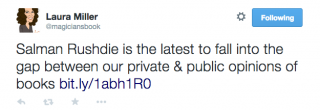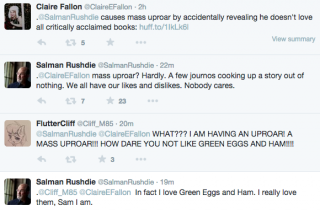April 7, 2015
Salman Rushdie pans classic novels on Goodreads. Does anyone care?
by Kirsten Reach

Rushdie has opinions. Via Shutterstock.
Today in author news that’s only questionably newsworthy, Salman Rushdie joined Goodreads. This might have made Twitter regardless–the man won a Booker Prize, and people pay attention to his presence online–but Rushdie managed to out himself as the kind of critic who doesn’t just mention the books he likes best on a website full of book reviews.
When you join Goodreads, you’re encouraged to rate a series of books, mostly classic titles. It may not be clear that this information will be posted to the site, but most readers would guess that Goodreads is trying to prompt you to stock your virtual shelves. Once your shelves look “full,” and Goodreads suitably has fed your ego, it can recommend other titles and nudge you to interact with the site.
When Salman Rushdie joined the site last Thursday, he rated forty-three titles from one to five. And, you know, the guy’s an acclaimed author. It didn’t take long for others to take note that his reviews were available to the public. Especially the less-flattering ones.
“Writers I know were scandalised,” reports Katy Guest of The Independent. “Others have felt emboldened to admit their own unfashionable dislikes.”
Claire Fallon of the Huffington Post writes, “Rushdie’s honesty, albeit accidental, feels deeply refreshing not just because frankness always is, but because public flattery and mutual back-scratching undermine the entire artistic community.”
You’re not obligated to hold your tongue online, either. As Jen Valfidis put it last week, “it’s not like we’re at a party together.” But if you’re as well-known as Rushdie, posting a three-star review seems like a public denouncement.
So which books Rushdie did pan? (Hint: one of them is a Melville House title!)
Reads to fall short in Rushdie’s ratings were The Death of the Heart by Elizabeth Bowen and Max Beerbohm’s Zuleika Dobson, while Robert Stone’s Dog Soldiers and The Golden Bowl by Henry James got five stars. The author of Midnight’s Children also rated classics such as F. Scott Fitzgerald’s The Great Gatsby and Evelyn Waugh’s A Handful of Dust as worth five stars on his virtual “bookshelf”.
Rushdie’s friend and son of Kingsley, Martin Amis, fared slightly better than his father, getting three stars for his 1984 novel Money. Rushdie’s five-star rating of A House for Mr Biswas may give its author, V S Naipaul, who won the Nobel Prize for Literature in 2001, something to smile about, however, as it has been reported that the pair have been locked in a long-running feud.
His reviews prompted a few writers to respond:




By far the more interesting story was last year’s Paris Review April Fools’ joke that featured a handful of selfies copied from Rushdie’s Instagram feed. Those quickly disappeared, too, but you can enjoy this year’s Paris Review for Young Readers instead.
What’s fascinating about social media missteps from famous writers is that we have the opportunity to debate how honest online reviews should be, whether reviews for Goodreads are governed by different rules than a review Rushdie would choose to publish in national media, and how these guidelines apply to our own GoodReads use (or Instagram, or any other sites that allow you to publish).
Rushdie hasn’t responded much (he thinks it’s silly anyone cares he joined Goodreads, and claims he was just messing around with the site), but his one public statement hit the right note:
I’m so clumsy in this new world of social media sometimes.
I thought these rankings were a private thing designed to tell the site what sort of book to recommend to me, or not recommend.
Turns out they are public. Stupid me.
We are all Salman Rushdie now.
Kirsten Reach is an editor at Melville House.